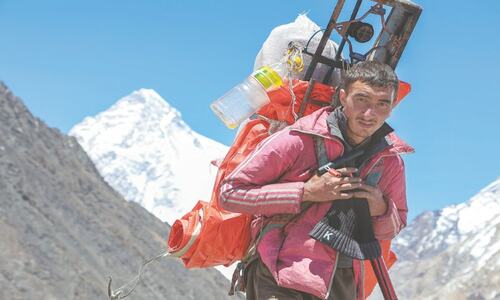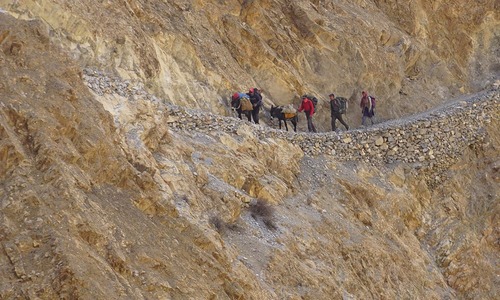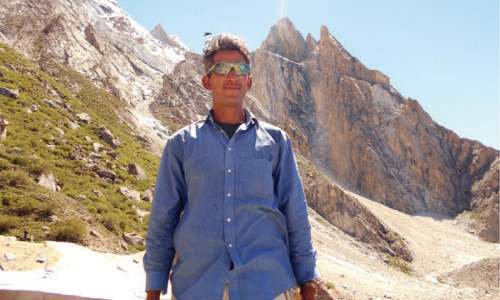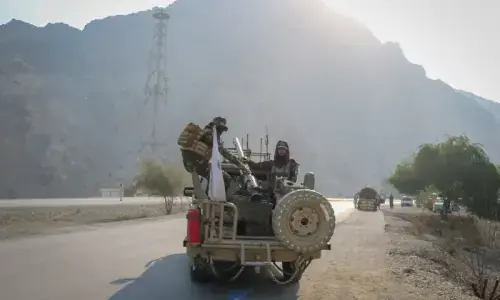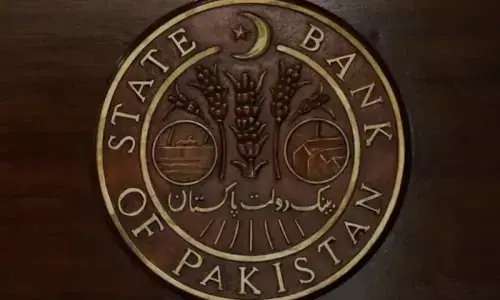THE easy availability and reach of cameras has changed the world in innumerable ways. From cell phone cameras to cameras affixed to drones to cameras on traffic intersections, every second of our lives is being recorded often unbeknownst to us. The dark side of this, obviously, is the constant invasion of privacy. The better side is that the proof that captured images and videos provide virtually substantiate what previously no one knew or believed. Naturally, the people that have not been believed have been the weak, the poor and the marginalised.
The disruption that this new era has brought into our world was accurately illustrated by a very tragic incident that took place on K2, the second highest mountain in the world. On July 27, a Pakistani porter named Mohammad Hassan who had been assigned to a team of climbers by a Pakistani tour company Lela Peak, fell from a narrow trail. Following the fall, Hassan was dangling upside down from a rope.
The next climbers that came along were a Norwegian climber named Kristin Harila and her team. Harila and her team were on their way to setting a world record which would see her (and her guide) becoming the world’s fastest climber by scaling the 14 highest peaks in the world in 92 days. K2 was the last mountain that she needed to climb. Two other climbers, Austrian Wilhelm Steindl and German climber Philip Flaemig whose ascent had been cancelled that day owing to bad weather later reviewed drone footage they had recorded of the area. When they saw the images the drone had captured, they were aghast. They saw that Harila’s team continued their ascent instead of stopping to assist Hassan. Steindl felt that the team should have stopped and helped get the injured Hassan down the mountain. “If I or any other Westerner had been lying there, everything would have been done to save them,” Steindl told AP. “Everyone would have had to turn back to bring the injured person back down to the valley.” Instead, dozens of mountaineers continued with their climb, ignoring the dying man who passed away. He leaves behind a mother, a wife and three children.
Harila presented what can only be seen as a sterilised account in which she insisted she would not have been able to help Hassan anyway. According to her, her cameraman Gabriel stayed behind and gave Hassan some hot water and tried to warm him. She said that the cameraman stayed with Hassan for over two hours until his own oxygen supply began to run so low that he had to abandon Hassan still in a precarious position and meet the rest of his team further up. Indeed, the question arises that if his oxygen had been running so low, shouldn’t he have gone down the mountain rather than up to meet her and record the triumphant moment when Harila scaled the summit?
Dozens of mountaineers continued with their climb, ignoring Mohammad Hassan who passed away.
The racism of Western mountain climbers in general is not new information. In Nepal, mountain porters have long been treated as invisible by Western climbers in their greedy pursuit of summits. The work of Sherpa guides who often go up ahead of the climbers has historically been erased even from the records of mountain climbing.
White men (and women) are credited with being the ‘first’ or the ‘fastest’, rather than these other ‘non-people’ who make their climb possible. It is only recently that this has even been considered problematic, which is a testament to just how normalised the ‘only white people matter’ belief has been in the climbing community and the sport of mountain climbing in general.
It is only very recently that Sherpa guides have begun to be treated better and their contributions have been recognised as equal to those of Western climbers. Even so, a huge divide remains as seen in the fact that the remote locations of the world’s highest mountains, which are in Nepal and Pakistan, mean that the people who work in these teams are quite dependent on the climbing industry for their livelihood.
Then there is the issue of gear which is notoriously expensive. One of the excuses that the Norwegian mountaineer made perhaps to cover up her own team’s neglectful role in the tragedy was to emphasise that Hassan had not been properly outfitted and lacked the proper gear and training to climb the mountain. While this does not excuse the callous neglect of Harila and her team, it does point to the fact that not only do these porters do all the necessary work, they do it without all the high-tech equipment that Western mountaineers have to do the same thing as their porters.
The authorities in Gilgit-Baltistan have launched an inquiry into the matter in order to see what actually happened on K2. The weather that day should have grounded all teams but since individual teams/ tour companies make their own decisions this issue is hard to monitor. Since it is the government of Gilgit-Baltistan that has jurisdiction over this matter, it is essential that their investigative team consider imposing certain requirements on tour companies operating in the mountain so that porters and climbers have the same gear. Since climbers are a notoriously selfish lot, there should also be some discussion on the application of criminal penalties for neglecting to appropriately aid a dying climber.
Harila and her team are undoubtedly being feted for a world record. The drone footage that raised the issue of their not coming to the aid of Mohammad Hassan during the ascent also shows them coming across his dead body during their descent. All of the team members can be seen just walking over it.
The writer is an attorney teaching constitutional law and political philosophy.
Published in Dawn, August 16th, 2023



